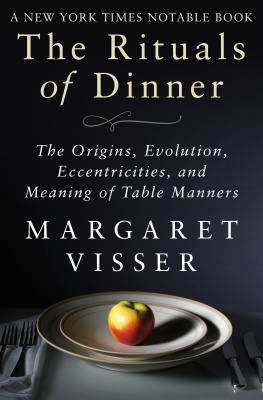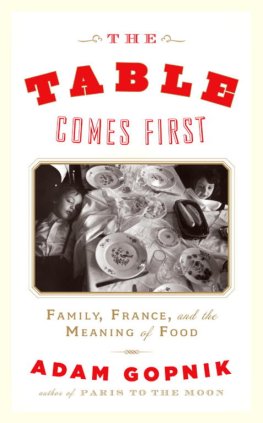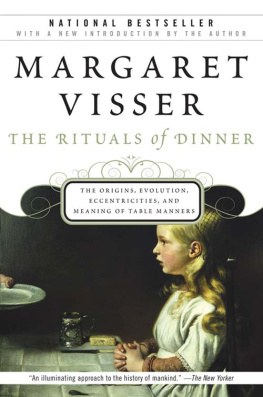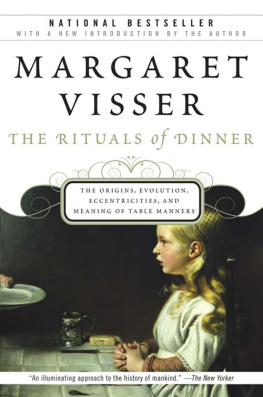The Rituals of Dinner
The Origins, Evolution, Eccentricities, and Meaning of Table Manners
Margaret Visser

Contents
For Emily and Alexander
PRAISE FOR THE WRITING OF MARGARET VISSER
The Rituals of Dinner
Winner of the IACPs Literary Food Writing and Jane Grigson Awards
A New York Times Notable Book
An illuminating approach to the history of mankind. The New Yorker
Ms. Visser reveals unexpected cultural connections and curiosities of natural history. A consistently thoughtful and entertaining book. The New York Times
The breadth of her knowledge is impressive, and she is irrepressibly enthusiastic about her subject. The Globe and Mail (Toronto)
[A] banquet of a book. Publishers Weekly
Visser offers a balanced explanation of how and why rules governing eating arose and why they persist. [She] has collected a wealth of information from a varied list of sources, making her book a valuable document. Library Journal
Another feast for trivia-blotters with a taste for class. Kirkus Reviews
The Geometry of Love
A Globe and Mail Book of the Year
A Toronto Star Best Book of the Year
Enthralling, absorbing and exquisitely researched. Publishers Weekly
The guidebooks tell you very little about the church, and even a keen visitor to Rome is likely to miss it. Margaret Visser makes the journey urgent and necessary, revelatory. Jeanette Winterson
Vissers thoughtful perspective gives license to those who find transcendence and majestysecular or religiousin spiritual architecture. Recommended. Library Journal
Reading the church building itself as a text, [Visser] renders its language of marble and mosaic into a splendid narrative whose subject is how an architectural space can both express and recall epiphany. The New Yorker
Wonderful food for the intellect as well as the soul. Toronto Star
Margaret Vissers excavation of what oblivion has buried is quietly fascinating and deeply pleasurable. Jack Miles, author of God: A Biography
Delightful a guidebook that starts where ordinary guidebooks leave off a profound analysis of [St. Agnes Outside the Walls] as a representative of churches, specifically Roman Catholic ones, everywhere. The Christian Science Monitor
Visser is a bestselling writer with a far-reaching mind, to whom readers can turn when, convinced of and satisfied with their own rational view of the universe, they wish to know more about that mysterious force that holds millions of people around the worldamong them legions of rigorous thinkers, scientists, minds both scholarly and skepticalon their knees in adoration in an ordinary church. The Globe and Mail (Toronto)
Introduction
This book is a commentary on the manifold meanings of the rituals of dinner; it is about how we eat, and why we eat as we do. Human beings work hard to supply themselves with food: first we have to find it, cultivate it, hunt it, make long-term plans to transport and store it, and keep struggling to secure regular supplies of it. Next we buy it, carry it home, and keep it until we are ready. Then we prepare it, clean it, skin, chop, cook, and dish it up. Now comes the climax of all our efforts, the easiest part: eating it. And immediately we start to cloak the proceedings with a system of rules. We insist on special places and times for eating, on specific equipment, on stylized decoration, on predictable sequence among the foods eaten, on limitation of movement, and on bodily propriety. In other words, we turn the consumption of food, a biological necessity, into a carefully cultured phenomenon. We use eating as a medium for social relationships: satisfaction of the most individual of needs becomes a means of creating community.
Table manners have a history, ancient and complex: each society has gradually evolved its system, altering its ways sometimes to suit circumstance, but also vigilantly maintaining its customs in order to support its ideals and its aesthetic style, and to buttress its identity. Our own society has made choices in order to arrive at the table manners we now observe. Other people, in other parts of the world today, have rules that are different from ours, and it is important to try to comprehend the reasoning that lies behind what they do if we are to understand what we do and why.
For in spite of the differences, table manners, all things considered, are remarkably similar both historically and the world over. There is a very strong tendency everywhere to prefer cleanliness or consideration for others or the solidarity of the dining group. Ritual emphases on such matters are occasionally highly idiosyncratic. But most rituals with these meanings have a good deal in common, and when people do things differently they usually do them for reasons that are easy to understand and appreciate. Sometimes, for example, festive diners are expected to eat a lot. Feasts are exceptional occasions, and a great deal of work has gone into them: the least a guest can do is show enjoyment. Fasting beforehand may very well be necessary, and exclaiming with pleasure, smacking ones lips, and so on might be thought both polite and benevolent. Other cultures prefer to stress that food is not everything, and guzzling is disgusting: restraint before the plenty offered is admired, and signifying enjoyment by word or deed is frowned upon. Sometimes it is correct to be silent while eating: food deserves respect and concentration. In other cases one must at all costs talk: we have met not merely to feed, but to commune with fellow human beings. Even though we come down on one side or the other, we can sympathize with the concerns that lie behind the alternative choice of action.
The book is organized neither chronologically nor by culture and geography. I have elected rather to travel, both in space and in timeto choose examples of behaviour from other places and periods of history wherever they throw light, whether by similarity or by difference, upon our own attitudes, traditions, and peculiarities of behaviour. My aim has been to enrich anyones experience of a meal in the European and American tradition, to heighten our awareness and interest on the occasions when we might be invited to share meals in other cultures, and to give the reader some idea of the great range of tradition, significance, and social sophistication which is inherent in the actions performed during the simplest dinner eaten with family or friends.
The two opening chapters deal with basic principles. The first of these considers why it is that every human society without exception obeys eating rules; what ritual is and why we need it at dinner (cannibalism, for instance, is found to conform to strict laws and controls); and the meaning of feasting and sacrifice. The second chapter is about how people the world over teach children table manners, and how our own culture evolved its dinnertime etiquette. We have insisted more and more strictly on bodily control; and we have often used table manners to serve class systems and snobbery.
Chapter Three starts to take us through a meal eaten in company with others: the etiquette of invitations, the laws governing hosts and guests, behaviour on arriving at somebodys house for dinner, and the seating arrangements. The dinner we are about to share is a sit-down meal with friends, some of them intimate and some only slight acquaintances; the party takes place in the hosts house. Such a meal invariably includes comfort, risk, and significance, complexity, plotting, setting, and dramatic structure enough to supply ample material for a book-length commentary. We necessarily leave out not only the specific menu of our meal, but also the characters and stories of individual guests, their preferences, conversation, and idiosyncrasieseverything that makes each dinner party different from every other. In this book we shall be concerned merely with conventions, where they come from, and what they signify.











